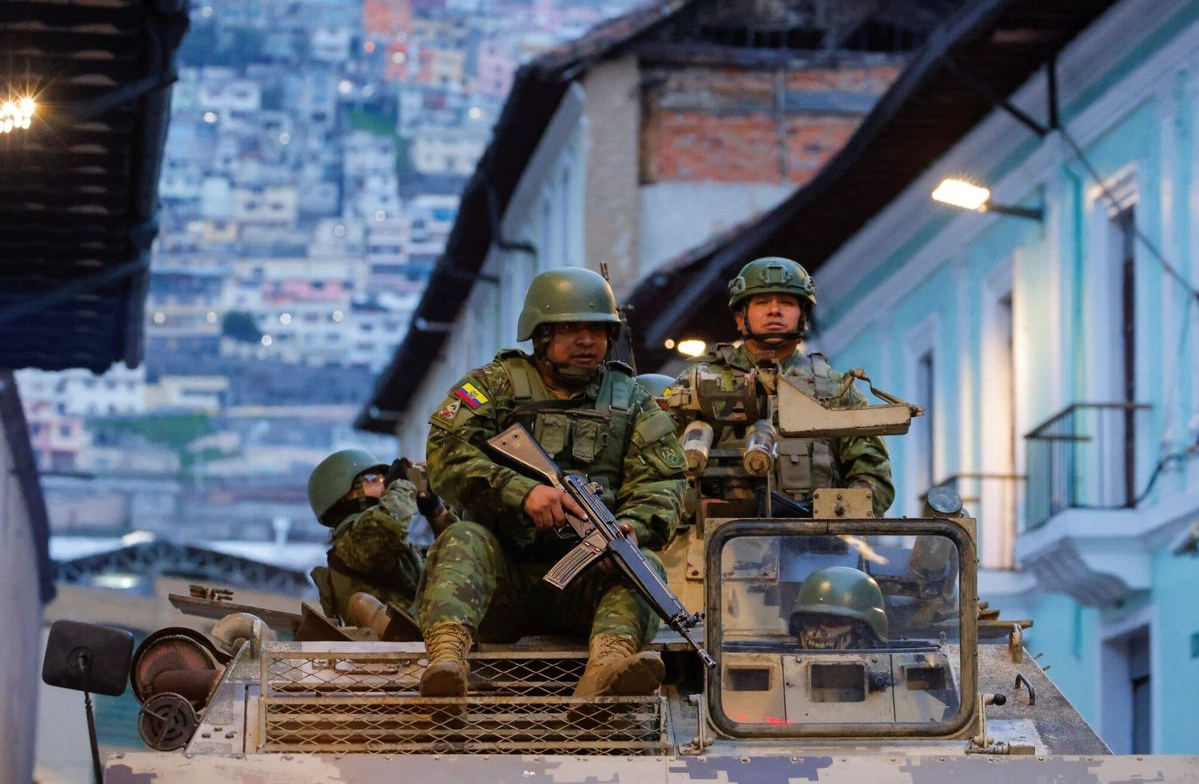Ecuadorian President Daniel Noboa declared “internal armed conflict” on January 9, 2024 after an outbreak of criminal violence during the first week of the year. Specialized voices of International Humanitarian Law immediately questioned the suitability of such a figure. In the country, beyond the persistent violence, there would not exist other conditions (centralized organizational structures of armed groups, capacity for coordinated action, willingness to dispute state power, among others) that make it plausible to affirm the existence of such a type of conflict.
The question was posed for the prosecution of the institutions. However, nothing was said by the National Assembly on the matter. Its support for Executive Decree 111 was unanimous. On January 11, for its part, the Constitutional Court ruled that two agreements with the U.S., which underpin the war strategy, did not need to pass through parliament — as required by the Constitution for certain international treaties and could be ratified directly by the Head of State. The alignment of the public powers with the so-called “war on terror” knows no fissures. All institutional gears shield President Daniel Noboa and his military front in a dynamic that operates, through the challenge of containing violence, for the re-legitimization of the power bloc eroded by five years of deplorable governments and state dismantling.
The Court’s rulings summarize well the ongoing process. For the judges, the treaties signed with the U.S. — one relating to the conditions of stay of military and civilian personnel in Ecuador and the other to operations against illicit transnational maritime activities — do not concern territorial matters nor do they imply a political-military alliance. Both grounds are included in the Constitution (art. 419) among the eight that require an international treaty to have parliamentary endorsement.
Injury to National Sovereignty
Any reading of the texts in question reveals, however, express references to U.S. military presence in national territory. Joint military operations, cession of criminal jurisdiction to the U.S. to judge its personnel based in the country, and use of the Ecuadorian radio-electric spectrum, among other aspects that damage sovereignty and verify the validity of a military alliance between both states.
In its rulings, the Court also avoids alluding not only to the “armed conflict” decreed by the president but also to the wave of violence that Ecuador has been experiencing since 2021 and that was already framed as “terrorism” to be repelled militarily. In April 2023, the state and Public Security Council, commanded by then President Guillermo Lasso, declared the criminal groups as “terrorists” and ordered an immediate military deployment against them.
Since then, purchases of Israeli weapons and negotiations with the US to prepare for combat have accelerated.
The first treaty with the superpower (air interception) was signed in mid-2023. Like those recently endorsed by the Court, it was negotiated during the previous government. The former president and the military installed the war scenarios that today are exhibited as a pioneering decision of Daniel Noboa, the last dolphin of the elites. The resolutions of the Constitutional Court, which mock the Assembly and erode the democratic debate, are best read in such a framework: the affirmation of the armed conflict in the heart of the power project of the dominant bloc and, by that way, the recomposition of its unity and its battered leaderships are underway. It is urgent for the powerful to leave behind the calamitous legacy of Guillermo Lasso, expelled from the government accused of corruption and mafia ties, and to recover credibility.
The war was scheduled
The haste of the Courts cannot be explained either by last-minute imperial pressures or as decisions in extremis to get out of hell. The war was scheduled. There is nothing to debate. No political force can oppose it, under penalty of being accused of association with drug trafficking. In the face of the crisis, the necessary national unity seems to imply the poisonous compromise of not activating the democratic controls of power.
If the treaties with the U.S. had reached the Assembly, only some dissident voices would have invoked sovereignty or asked for details on the state plans veiled by warmongering rhetoric. But that democratic minimum is too much. Those who invoke human rights (HR) to condemn military abuses of “suspects” — always poor and racialized — have been attacked in social networks and mainstream media. While the courts protect the war from above, the fearful majorities applaud it from below.
The precarious calm of the country after the decree already gives the president very high support (80%). With a doubled legislative majority, Noboa relaunches neoliberal austerity and the search for mining investments, invoking the costs of peace. Meanwhile, the collapse of the welfare state continues. It is also foreseen to increase the security budget.
No one will object: support for the military has reached figures such as those of Bukele (90%). Perhaps that is the reason few are talking about the purge of the public force, which the criminal penetration of the institutions has stained. The power is oxygenated. Even more so after the last resolution of the Constitutional Court on March 3, 2024, which, after a heavy silence, endorsed decree 111 and gave way for the military intervention in internal security to continue even without a state of exception. All power to the tanks.
*Translated by Janaína Ruviaro da Silva from the original in Spanish.











